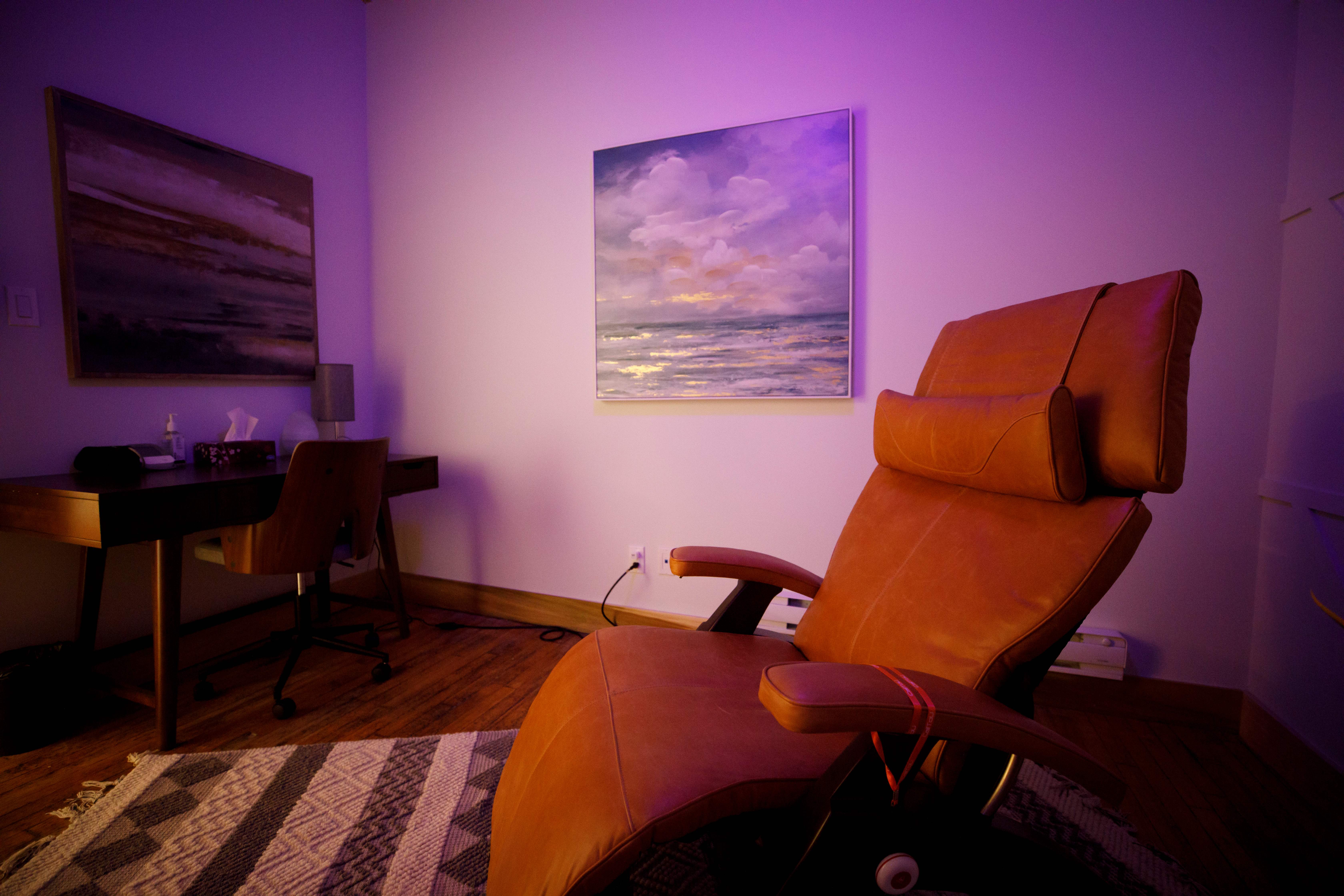Ketamine Therapy Providers Say They’re Running Out of the Drug
Ketamine therapy is booming but clinics who treat people with depression and suicidal ideation say they’re being cut off from their supply.

When one of Melissa Whippo’s clients was assaulted in her home, the client wanted ketamine to help her process the trauma she was experiencing. But Whippo, a psychotherapist who offers ketamine-assisted therapy in Oakland, almost wasn’t able to provide that—because she was down to her last dose of the drug.
“We knew that this treatment would help her be able to function. She's a mom, she needed to be able to function,” Whippo said.
Not all of her clients have been as lucky. Whippo has had to turn away several people dealing with mental illness due to what she and other ketamine therapists are describing as a shortage in the supply—one that they fear could have disastrous outcomes, include suicide.
“One person I worked with, his depression definitely worsened,” Whippo said. “I have to believe that part of it is because this treatment is helpful to him. But we couldn't schedule him because we didn't have access to medicine.”
For months, a number of ketamine-assisted therapy providers have said their ability to obtain the drug has been hindered, according to clinicians and patients who spoke to VICE News. Though the reasons for the decline in access are not clear, the American Society of Ketamine Physicians, Psychotherapists and Practitioners (ASKP3) said a variety of factors could be at play, including supply chain and manufacturing issues, increased demand in part due to telehealth prescriptions, and a crackdown from manufacturers on supply ketamine for non-surgical purposes.
The group is calling for more transparency from the Food and Drug Administration, the Drug Enforcement Administration, and ketamine manufacturers about what’s behind the shortage and what steps are being taken to resolve it.
“Many patients impacted by these issues suffer from chronic suicidal ideation and severe depression, and disruption to their treatment can be catastrophic,” said a statement from the ASKP3.
Ketamine, a dissociative, is the only fully legal psychedelic in the U.S. because it’s an approved anaesthetic. Its uses in the treatment of mental health conditions, including post-traumatic stress disorder and depression, are considered “off-label,” because the FDA did not approve it for those purposes. Nonetheless, as part of the wider psychedelic renaissance, it has gained popularity in the last few years, with hundreds of clinics offering tens of thousands of patients ketamine infusions, where the drug is administered intravenously, and telehealth companies offering oral versions such as tablets or lozenges, which can be taken without supervision.
The FDA’s website notes that ketamine hydrochloride injections, which are used by ketamine therapy clinics, has been in shortage since 2018. The agency also recently issued a warning about using ketamine for the treatment of psychiatric disorders, particularly focusing on non-FDA approved formulations of the drug, like lozenges or tablets.
“Despite increased interest in the use of compounded ketamine, we are not aware of evidence to suggest that it is safer, is more effective, or works faster than medications that are FDA approved for the treatment of certain psychiatric disorders,” the alert said.
A study published last September in the Journal of Clinical Psychiatry found that ketamine infusions were effective at treating treatment-resistant depression, with a 50 percent reduction in suicidal ideation symptoms after 10 sessions.
The ASKP3 recently surveyed its 400 members about the shortage. Of the 126 that responded, 82 percent said they had difficulties obtaining ketamine recently and 8 percent said they had been forced to close or were contemplating shutting down. One practitioner said their patient died by suicide following a delay in their treatment.
“In patients who are being treated with this successfully and it's resolved their suicidality, ketamine is a treatment, not a cure,” said Dr. Sandhya Prashad, president of ASKP3. “It's important that they have consistent treatment. And when it's starting to kind of wear off and they're due for treatment, they can be at a high risk of suicide.”
It’s a familiar scenario to Kimberly Juroviesky, 53, a U.S. military veteran who said ketamine has severely reduced the pain stemming from her complex regional pain syndrome—a condition that “causes you to feel like your body is on fire.”
Juroviesky, who lives in Boca Raton, Florida, retired from the Air Force in 2011 after her right arm and leg got injured during a training exercise. She tried physical therapy and numerous prescription drugs, but said she was in so much pain she “couldn’t put a sock on.” Eventually, she stopped leaving the house and had suicidal thoughts, until she was accepted into a ketamine study in 2015.
“It reduced my pain by 50 percent, it made my depression better, it made my suicidal ideation go away,” she said. These days, she said her ketamine infusions reduce her pain by up to 80 percent in the first couple of weeks. But the feeling doesn’t last and she needs a booster every three months.
Juroviesky hasn’t experienced the shortage first hand, but as president of the Ketamine Taskforce, a volunteer organization dedicated to fighting for veterans to have access to the psychedelic, she has heard from 20 patients and over 100 providers dealing with it.
Emails she shared with VICE News indicated that two of the most popular ketamine providers in the U.S.—McKesson and Henry Schein—are cracking down on supplying the drug to anyone using it for off-label purposes. She said she began hearing about McKesson’s restrictions in March 2021 and Henry Schein about a year later.
A letter from McKesson to one provider notes, “McKesson will not approve controlled substances ordering for customers that seek to purchase ketamine and other controlled substances for non-surgical uses, such as ketamine infusion. McKesson will not reconsider this decision.”
“Effective immediately, ACE Southern is discontinuing distribution of any controlled substances to all infusion clinics and customers who administer Ketamine in any form that is considered by the FDA to be off-label use. This includes, but is not limited to, the use of Ketamine for depression, anxiety, PTSD, acute/chronic pain and substance use disorder,” says a similar letter from ACE Southern Surgical Solutions, a subsidiary of Henry Schein.
Neither McKesson nor Henry Schein responded to VICE News’ requests for comment.
The Food and Drug Administration did not answer specifics about the ketamine shortage but said, “the public should rest assured the FDA is working closely with numerous manufacturers, agencies, and others in the supply chain to understand, mitigate and prevent or reduce the impact of intermittent or increased demand of certain products.”
Whippo and one other ketamine therapy clinician who spoke to VICE News said they have turned to compounding pharmacies, which can make their own medications, as alternative source of ketamine.
But that has its drawbacks. Whippo said the pharmacy her clinic uses has run out of ketamine a couple of times. It also requires the doctor to order individual doses for each patient, which can only be used by that patient, rather than ordering a larger stock to have on hand at the clinic. It’s more expensive and time consuming because of the individual orders, she said, and packages have been held up by delays or gone missing, which pushes back a person’s treatment even further.
Whippo fears the shortage isn’t going away anytime soon, and said she and other ketamine therapy providers need to equip their clients for that scenario.
“We have to be mindful about all of the ways in which we're working with our patients and that we're really giving our patients a lot of tools beyond the medicine so that at the very least they can lie down and put on eye shades and listen to a ketamine playlist. And if they don't have medicine, they can somehow access that feeling inside of themselves as an anchor.”



